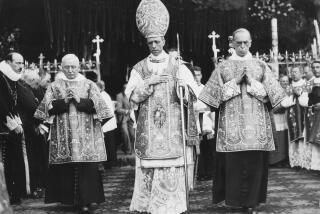Hussein Warned His Loyalists to Be Wary of Foreign Fighters
- Share via
WASHINGTON — Deposed Iraqi President Saddam Hussein advised loyalists engaged in a guerrilla campaign against U.S. forces to be wary of foreign fighters entering the country to join the cause, according to a document found with Hussein when he was captured last month, a U.S. official said Wednesday.
The document has reinforced the impression among U.S. intelligence analysts that the resistance is being carried out by multiple groups whose agendas sometimes compete with one another.
It is also seen by some as evidence that Hussein probably did not have close ties with Al Qaeda or other extremist groups.
The existence of the document was first reported by the New York Times on Wednesday.
“What it does is advise Baathist regime elements to be wary of foreign fighters,” the U.S. official said, describing the contents of the document, which was the subject of an intelligence report recently distributed to U.S. government officials.
But the official stressed that although Hussein urged his followers to be cautious in their dealings with other fighters, he did not order them to avoid contact or rule out cooperation. “It wasn’t necessarily discouraging them from collaborating,” the official said.
The document was among dozens found in Hussein’s possession at the cramped living quarters near Tikrit where the former dictator was found by U.S. forces Dec. 13.
The U.S. official said those other papers also had shed light on the composition of the insurgency in Iraq -- or at least the portion with direct ties to Hussein. The CIA has seen no reason to doubt the authenticity of the document that was the subject of the intelligence report, he said. He declined to elaborate on its contents.
The document appears to reflect Hussein’s concern that foreign fighters would not share the same objective as that of Baathist loyalists: the return of Hussein to power and the restoration of his regime. Many experts believe that fighters who have flocked to Iraq to join the insurgency are motivated by animosity toward the United States and the desire to install an Islamic state.
The existence of the document underscores the fact that “this is an insurgency cut of many different cloths,” said Bruce Hoffman, a Washington-based counter-terrorism expert at the Rand Corp. think tank.
“Everybody’s jockeying for their position of power in the future Iraq.”
U.S. military officials have said that several hundred foreign fighters are in custody. Experts think that thousands have entered the country across Syria’s porous border or from other directions. U.S. intelligence remains unclear on the extent to which Iraqi insurgents have been cooperating and coordinating with foreigners.
U.S. officials believe that regime loyalists and Iraqi insurgents are the driving force of the resistance but that foreign fighters probably have been involved in the suicide bombing attacks on the Red Cross, the United Nations and other targets. Iraqis are seen as unlikely to volunteer for such missions, but they may have played a role in picking targets or carrying out those attacks.
“I think the Iraqis might have gladly used [foreign fighters] as cannon fodder,” Hoffman said. “The people that Al Qaeda or Islamic radicals are sending in are not the A-team.”
More to Read
Sign up for Essential California
The most important California stories and recommendations in your inbox every morning.
You may occasionally receive promotional content from the Los Angeles Times.












